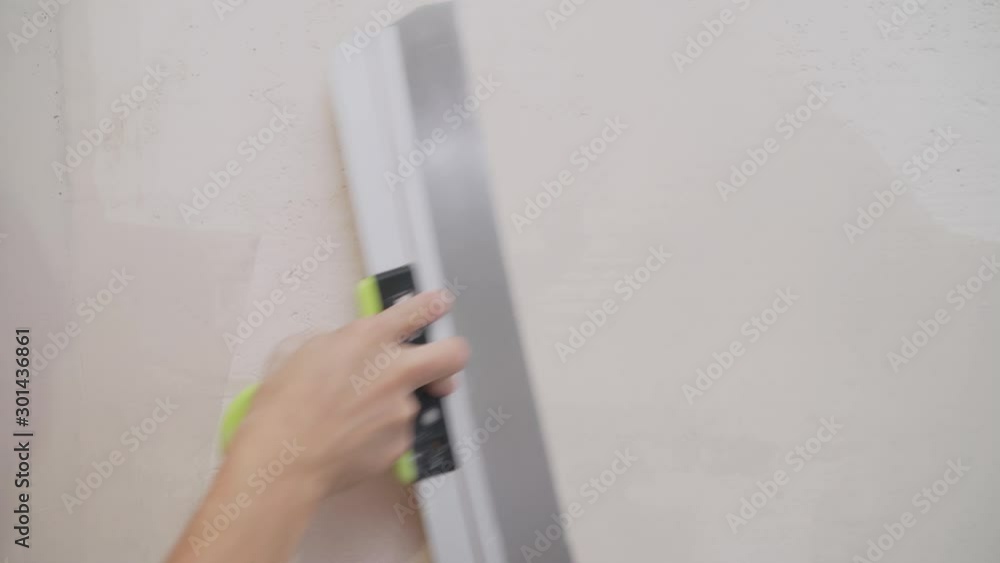Have you ever found yourself staring at a bag of mortar, wondering if it’s the right tool for the job? Maybe you’re tackling a DIY project, or perhaps you’re a seasoned builder looking for alternative solutions. The question of whether you can use floor mortar on walls is a common one, and it’s essential to understand the nuances before you start mixing!

Image: stock.adobe.com
Mortar is a versatile material used in both flooring and wall construction. Although the core ingredients may be similar, the specific formulas and applications differ significantly. Today, we’ll delve into the intricacies of floor mortar versus wall mortar, exploring why you might choose one over the other and the potential risks involved when using them interchangeably.
Understanding the Difference: Floor Mortar vs. Wall Mortar
Let’s start with the basics: both floor mortar and wall mortar are composed of cement, sand, and water. However, their proportions, additives, and intended uses differ significantly.
Floor Mortar:
- Purpose: Specifically designed to handle heavy loads and withstand wear and tear. It is often used for setting tiles, bricks, and concrete blocks on floors, patios, and driveways.
- Key Features:
- Stronger & Durable: Floor mortar is typically a more robust mix with higher cement content, delivering greater strength and durability.
- Compression Strength: It is engineered to bear heavy loads and resist crushing, making it ideal for flooring applications.
- Water Resistance: Many floor mortar mixes contain special additives for increased water resistance, protecting against moisture damage.
Wall Mortar:
- Purpose: Employed for building walls, laying bricks, and securing stonework. Its primary function is to bond different materials together.
- Key Features:
- Flexibility & Bonding: Wall mortar is typically more pliable and flexible than floor mortar, allowing it to adjust to the movement of walls.
- Adhesive Properties: The composition of wall mortar is tailored to create strong bonds between building materials.
- Workability: Wall mortar is designed to be easier to work with and spread, facilitating the construction of walls and other structural elements.
Can You Use Floor Mortar on Walls?
The short answer is: sometimes, but with caution.
While it may seem like a convenient workaround, using floor mortar on walls can lead to several potential problems.
Potential Drawbacks:
- Flexibility & Movement: Unlike wall mortar, floor mortar is less flexible. Walls often experience some movement as they expand and contract due to temperature changes and settling. Floor mortar’s rigid nature could lead to cracks or even structural issues in the long run.
- Adhesion: While floor mortar provides impressive strength, the additives meant for resisting wear and tear might not contribute to optimal adhesion when bonding different wall materials. This can result in weakened walls, leaving you with a less-than-ideal build.
- Workability & Application: Floor mortar is often formulated to be thick and dense, making it less workable for spreading and smoothing on walls. This can lead to uneven surfaces and a less aesthetically pleasing finish.
- Cost Considerations: Floor mortar is generally more expensive than wall mortar due to its higher cement content and specialized ingredients.
When Might Floor Mortar Be Suitable For Walls?
There are a few specific scenarios where using floor mortar on walls could be a viable option:
- High-Traffic Areas: In environments where walls are exposed to heavy wear and tear, like commercial spaces or industrial buildings, the increased strength of floor mortar might be beneficial.
- Moisture Resistance: If the wall is located in an area prone to moisture, such as a basement or bathroom, the water-resistant properties of floor mortar could be advantageous.
- Exterior Walls: When building exterior walls that will be exposed to severe weather conditions, the durability and water resistance of floor mortar could prove useful.
However, it’s crucial to consult with a qualified contractor or construction professional to assess whether floor mortar is suitable for your specific project. Their expertise can guide you towards the most appropriate materials and avoid any unforeseen complications.

Image: www.indiamart.com
Choosing the Right Mortar for Your Project
The key to successful construction lies in selecting the right materials for the job. Here are a few considerations when choosing between floor mortar and wall mortar:
Floor Mortar:
- Ideal Uses:
- Flooring applications (tiles, bricks, concrete blocks)
- Patios, driveways, and walkways
- High-traffic areas requiring superior durability
- Key Advantages:
- High compressive strength
- Excellent water resistance
- Durable and resistant to wear and tear
Wall Mortar:
- Ideal Uses:
- Building walls (bricks, stones)
- Constructing interior and exterior walls
- Bonding diverse building materials
- Key Advantages:
- Flexibility and movement-resistant
- Excellent adhesive properties
- Easy to work with and spread
Expert Insights and Actionable Tips
Seeking Professional Guidance: “Always consult with a licensed contractor or structural engineer before making any decisions about using floor mortar on walls,” emphasizes Sarah Jones, a seasoned contractor with over 20 years of experience. “They can evaluate your specific project, assess potential risks, and recommend the optimal materials for your needs.”
Focus on Quality: “Investing in high-quality mortar from reputable brands is critical, especially when building walls,” advises John Smith, a construction engineer specializing in structural integrity. “Using subpar materials can compromise the integrity of your build and lead to costly repairs in the future.”
Can You Use Floor Mortar On Walls
Conclusion
While the temptation to use readily available materials might be enticing, it’s vital to prioritize informed decision-making when it comes to your construction projects. Understanding the distinct characteristics of floor mortar and wall mortar can ensure that you select the appropriate materials for a safe and successful build.
Remember, consulting with a qualified professional is your best bet to ensure long-lasting and reliable results. Explore further resources such as building codes and industry guidelines for additional information on selecting the right mortar for your walls and floors.






